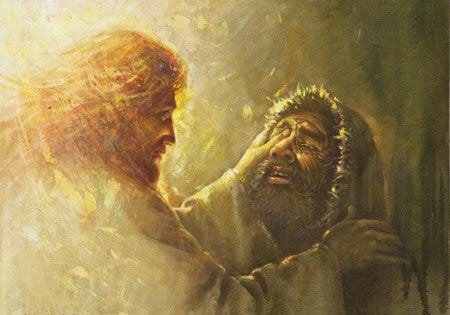Total Salvation

Seven hundred years before Jesus returned home to Nazareth after his forty-day testing in the wilderness, Isaiah prophesied of an Anointed One, a Messiah, who would come to glorify Israel and fulfill her purpose of bringing salvation to the Gentiles. When Jesus stands and reads from the scroll of Isaiah on that Sabbath in Nazareth, he tells his family and hometown friends, “Today this Scripture has been fulfilled in your ears” (Lk 4.16-21). Jesus is the Anointed One who would announce that God’s promised salvation had begun.
The nature of his salvific mission is summarized in Isaiah’s prophecy:
The Spirit of the Lord is upon me, Because he has anointed me to preach the gospel to the poor, He has sent me to proclaim deliverance to the captives and recovery of sight to the blind, to send away the oppressed/broken ones in pardon, to proclaim the year of the Lord’s favor. (Isa 61.1-2a)
The Spirit Jesus received in baptism, who led him through testing, and in whose power he has returned to Galilee (Lk 4.14) is the Spirit that will remain with him through his ministry. As in the original creation the Spirit carries the Word of God to form and fill the creation, so, now, the Spirit is carrying the Word-made-flesh to bring about a new creation.
Word and Spirit work seamlessly and powerfully together proclaiming the gospel, the good news, to the poor. The poor in Luke are not merely those who are financially deprived. Financial deprivation may be in view, but that is not the fundamental meaning of “poor” for Luke. The poor are those who are deprived of covenant promise-fulfillment. They are God’s faithful people who have longed for the kingdom of heaven, for God to arrange everything under the lordship of his Son, to enact his righteousness upon the earth. Since the time of Adam, they have been deprived of this. They are those who suffer under the tyranny of sin and Satan, whose rule is embodied in the present world rulers who exalt the wicked and condemn the righteous. Jesus hasn’t come to be the equivalent of today’s caricatured Social Justice Warrior who wants to take from the rich and give to the poor in a simple monetary transfer. Jesus has come to bring true social justice that destroys the power behind all tyranny that exalts the wicked and oppresses the righteous. The good news is that God’s faithful people who are currently deprived of their rights as God’s faithful ones will be exalted over the wicked.
This gospel preached by God’s Spirit-Anointed One efficaciously announces deliverance to the captives, recovery of sight to the blind, and to send away the oppressed or broken ones in pardon. Wherever the effects of sin and the power of Satan have held people captive, God’s re-creative Word-and-Spirit is releasing them from bondage.
We are tempted to think of all that is said here as referring to sin problems divorced from our physical bodies and societal structures. Salvation is release from hell, recovery of sight to the blind refers to our spiritual blindness, and pardon changes our legal position before God. That is a terribly truncated view of God’s salvation. All of those benefits are true, but they are not complete. God’s Anointed One has come to restore, transform, and bring to maturity everything in the created order. Your body and government structures are both in the purview of salvation. Jesus’ healings of blind people, for example, weren’t glorified magic tricks in order to get people to see the need for something internal in a way totally divorced from bodily rescue. The gospel includes the salvation of the body realized ultimately in our resurrection from the dead. The gospel doesn’t use oppressive government institutions as disassociated analogies of a personal spiritual problem. Sin has infected the way we make and enforce laws, the way we live together as the image of God. The King has come to turn these structures over and set them right.
Everything he is doing will be the Jubilee of Jubilees: the year of the Lord’s favor (cf. Lev 25). He is anointed to proclaim that all debts are being canceled and the inheritance land that rightfully belongs us, his faithful people, is being returned (cf. Rom 4.13).
All of this has already begun because Christ Jesus has died and risen again, making a new creation. In this Lenten season we are reminded that, while everything has begun, not all things are yet complete. We are renewed in Christ, our bodies being joined to his body in baptism, but we wait for our final healing. The principalities and powers of the world have all been reconciled to Christ, but we continue to wait for righteous rule to be finally exercised on the earth.
We wait, but we wait in certain hope. All things have been made new in Christ, and, one day, we will see all things gloriously new.
The post Total Salvation appeared first on Kuyperian Commentary.

